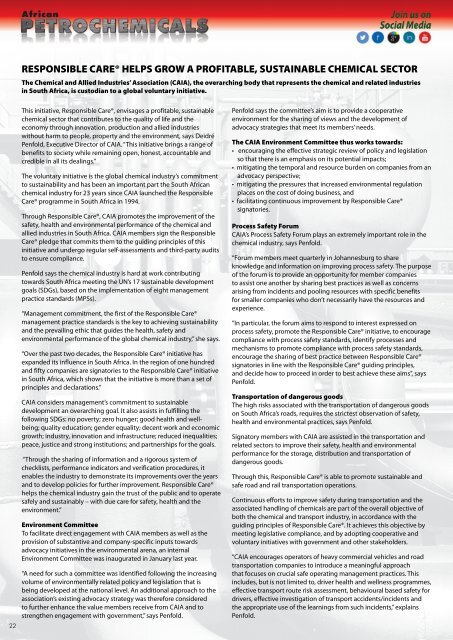African Petrochemicals Edition 14_5 web
Create successful ePaper yourself
Turn your PDF publications into a flip-book with our unique Google optimized e-Paper software.
RESPONSIBLE CARE® HELPS GROW A PROFITABLE, SUSTAINABLE CHEMICAL SECTOR<br />
The Chemical and Allied Industries’ Association (CAIA), the overarching body that represents the chemical and related industries<br />
in South Africa, is custodian to a global voluntary initiative.<br />
22<br />
This initiative, Responsible Care®, envisages a profitable, sustainable<br />
chemical sector that contributes to the quality of life and the<br />
economy through innovation, production and allied industries<br />
without harm to people, property and the environment, says Deidré<br />
Penfold, Executive Director of CAIA. “This initiative brings a range of<br />
benefits to society while remaining open, honest, accountable and<br />
credible in all its dealings.”<br />
The voluntary initiative is the global chemical industry’s commitment<br />
to sustainability and has been an important part the South <strong>African</strong><br />
chemical industry for 23 years since CAIA launched the Responsible<br />
Care® programme in South Africa in 1994.<br />
Through Responsible Care®, CAIA promotes the improvement of the<br />
safety, health and environmental performance of the chemical and<br />
allied industries in South Africa. CAIA members sign the Responsible<br />
Care® pledge that commits them to the guiding principles of this<br />
initiative and undergo regular self-assessments and third-party audits<br />
to ensure compliance.<br />
Penfold says the chemical industry is hard at work contributing<br />
towards South Africa meeting the UN’s 17 sustainable development<br />
goals (SDGs), based on the implementation of eight management<br />
practice standards (MPSs).<br />
“Management commitment, the first of the Responsible Care®<br />
management practice standards is the key to achieving sustainability<br />
and the prevailing ethic that guides the health, safety and<br />
environmental performance of the global chemical industry,” she says.<br />
“Over the past two decades, the Responsible Care® initiative has<br />
expanded its influence in South Africa. In the region of one hundred<br />
and fifty companies are signatories to the Responsible Care® initiative<br />
in South Africa, which shows that the initiative is more than a set of<br />
principles and declarations.”<br />
CAIA considers management’s commitment to sustainable<br />
development an overarching goal. It also assists in fulfilling the<br />
following SDGs: no poverty; zero hunger; good health and wellbeing;<br />
quality education; gender equality; decent work and economic<br />
growth; industry, innovation and infrastructure; reduced inequalities;<br />
peace, justice and strong institutions; and partnerships for the goals.<br />
“Through the sharing of information and a rigorous system of<br />
checklists, performance indicators and verification procedures, it<br />
enables the industry to demonstrate its improvements over the years<br />
and to develop policies for further improvement. Responsible Care®<br />
helps the chemical industry gain the trust of the public and to operate<br />
safely and sustainably – with due care for safety, health and the<br />
environment.”<br />
Environment Committee<br />
To facilitate direct engagement with CAIA members as well as the<br />
provision of substantive and company-specific inputs towards<br />
advocacy initiatives in the environmental arena, an internal<br />
Environment Committee was inaugurated in January last year.<br />
“A need for such a committee was identified following the increasing<br />
volume of environmentally related policy and legislation that is<br />
being developed at the national level. An additional approach to the<br />
association’s existing advocacy strategy was therefore considered<br />
to further enhance the value members receive from CAIA and to<br />
strengthen engagement with government,” says Penfold.<br />
Penfold says the committee’s aim is to provide a cooperative<br />
environment for the sharing of views and the development of<br />
advocacy strategies that meet its members’ needs.<br />
The CAIA Environment Committee thus works towards:<br />
• encouraging the effective strategic review of policy and legislation<br />
so that there is an emphasis on its potential impacts;<br />
• mitigating the temporal and resource burden on companies from an<br />
advocacy perspective;<br />
• mitigating the pressures that increased environmental regulation<br />
places on the cost of doing business, and<br />
• facilitating continuous improvement by Responsible Care®<br />
signatories.<br />
Process Safety Forum<br />
CAIA’s Process Safety Forum plays an extremely important role in the<br />
chemical industry, says Penfold.<br />
“Forum members meet quarterly in Johannesburg to share<br />
knowledge and information on improving process safety. The purpose<br />
of the forum is to provide an opportunity for member companies<br />
to assist one another by sharing best practices as well as concerns<br />
arising from incidents and pooling resources with specific benefits<br />
for smaller companies who don’t necessarily have the resources and<br />
experience.<br />
“In particular, the forum aims to respond to interest expressed on<br />
process safety, promote the Responsible Care® initiative, to encourage<br />
compliance with process safety standards, identify processes and<br />
mechanisms to promote compliance with process safety standards,<br />
encourage the sharing of best practice between Responsible Care®<br />
signatories in line with the Responsible Care® guiding principles,<br />
and decide how to proceed in order to best achieve these aims”, says<br />
Penfold.<br />
Transportation of dangerous goods<br />
The high risks associated with the transportation of dangerous goods<br />
on South Africa’s roads, requires the strictest observation of safety,<br />
health and environmental practices, says Penfold.<br />
Signatory members with CAIA are assisted in the transportation and<br />
related sectors to improve their safety, health and environmental<br />
performance for the storage, distribution and transportation of<br />
dangerous goods.<br />
Through this, Responsible Care® is able to promote sustainable and<br />
safe road and rail transportation operations.<br />
Continuous efforts to improve safety during transportation and the<br />
associated handling of chemicals are part of the overall objective of<br />
both the chemical and transport industry, in accordance with the<br />
guiding principles of Responsible Care®. It achieves this objective by<br />
meeting legislative compliance, and by adopting cooperative and<br />
voluntary initiatives with government and other stakeholders.<br />
“CAIA encourages operators of heavy commercial vehicles and road<br />
transportation companies to introduce a meaningful approach<br />
that focuses on crucial safe operating management practices. This<br />
includes, but is not limited to, driver health and wellness programmes,<br />
effective transport route risk assessment, behavioural based safety for<br />
drivers, effective investigation of transport accidents/incidents and<br />
the appropriate use of the learnings from such incidents,” explains<br />
Penfold.

















